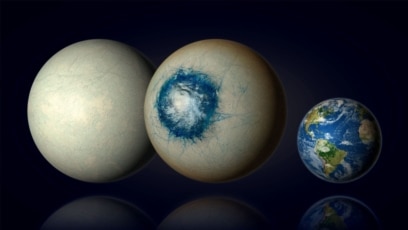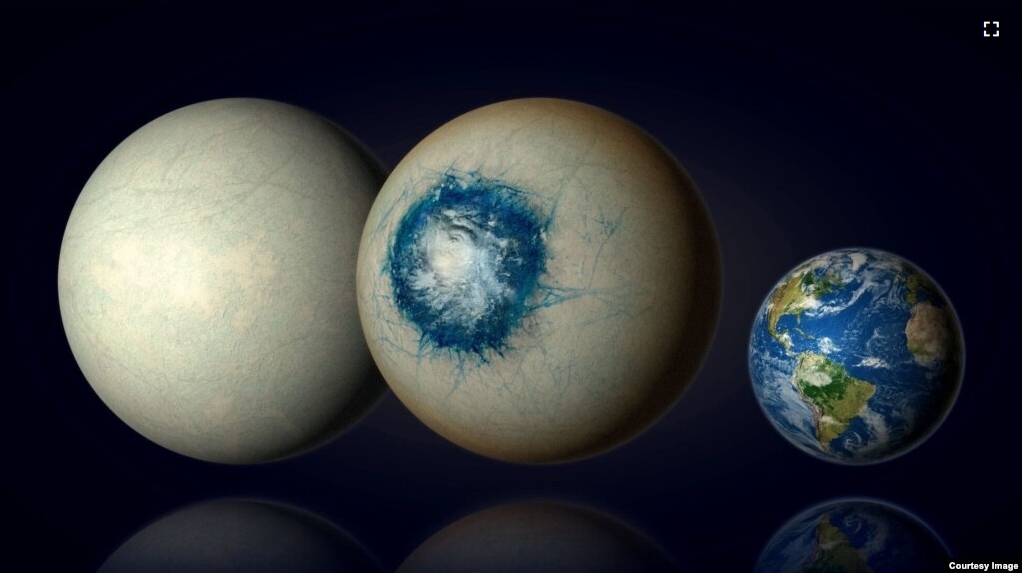Researchers say new telescope observations suggest an Earth-like planet outside our solar system may hold a large liquid ocean.
The exoplanet is known as LHS 1140 b. Astronomers believe it sits about 48 light years away from Earth. A light year is the distance light travels in a year – about 9.5 trillion kilometers.
The research – led by astronomers at the University of Montreal in Canada – shows the possibility the exoplanet might hold the right conditions to support some form of life. A study explaining the findings recently appeared in The Astrophysical Journal Letters.
The study is based on observations collected in December 2023 by the James Webb Space Telescope. The American space agency NASA operates the orbiting observatory.
Researchers combined the information from the James Webb with existing data to make new estimates for the exoplanet’s mass and size. These suggest that LHS 1140 b is “a promising super-Earth ice or water world,” the University of Montreal said in a statement.
Some past studies had suggested the exoplanet might be a gas giant, also known as a mini-Neptune. But the researchers said the new study provides evidence that LHS 1140 b is more likely a super-Earth, a rocky planet bigger than Earth.
The new research supports a NASA-led study from October 2023 that suggested at least 17 observed exoplanets could hold oceans of liquid water. That study noted that sometimes water from these oceans likely breaks through large pieces of ice to form geysers.
Scientists had already identified LHS 1140 b as being within its star’s “habitable zone.” Exoplanets found within this zone are believed to have temperatures that would permit water to exist in liquid form.
Measurements made by the James Webb data suggest the exoplanet “is less dense” than expected for a rocky, Earth-like body. The researchers estimated that 10 to 20 percent of LHS 1140 b’s mass might be made up of water. The possibility of a large liquid ocean would be found on the side of the planet always facing the star that it orbits.
The new data collected by the James Webb showed the exoplanet might also have a nitrogen-rich atmosphere. This differs from earlier research that suggested a possible atmosphere that was mostly hydrogen.
Charles Cadieux is a doctoral student at the University of Montreal’s Trottier Institute for Research on Exoplanets. He was the lead writer of the study.
Cadieux said in a statement, “Of all currently known temperate exoplanets, LHS 1140 b could well be our best bet to one day indirectly confirm liquid water on the surface of an alien world beyond our solar system.” He noted that if the study’s findings can be confirmed, the data would represent “a major milestone” in the search for exoplanets that could possibly support life.
René Doyon is a project scientist at the University of Montreal. He helped lead the research. He said more observations will be needed to confirm the current study’s findings. “The current hint of a nitrogen-rich atmosphere begs for confirmation with more data,” Doyon said.
He estimated that at least one more year of observations will be needed “to confirm that LHS 1140 b has an atmosphere.”
The process of confirming whether carbon dioxide is present in the atmosphere and liquid water exists on the surface would likely require several years of observations, Doyon noted.
Ryan MacDonald is a NASA Sagan Fellow in the University of Michigan’s Department of Astronomy who helped examine the James Webb data. He said, “This is the first time we have ever seen a hint of an atmosphere on a habitable zone rocky or ice-rich exoplanet.”
With further data collection and investigation, MacDonald noted there is a good possibility “we might just have found evidence of air on this world.”
I’m Bryan Lynn.
Bryan Lynn wrote this story for VOA Learning English, based on reports from the University of Montreal, the University of Michigan and NASA.
Quiz – Study: New Evidence Suggests Earth-like Exoplanet May Hold Liquid Ocean

Start the Quiz to find out
___________________________________________
Words in This Story
geyser – n. a hole in the ground from which hot water and steam come out
habitable – adj. able to support life
best bet – idiom. the action that is most likely to be successful
alien – n. relating to creatures from another planet
milestone – n. an important event in the development or history of something
hint – n. to suggest or indicate something in an indirect way
beg – v. to make a very strong and urgent request
